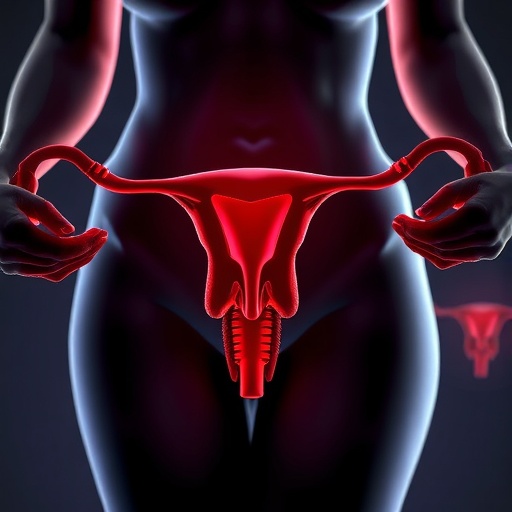Polycystic ovary syndrome (PCOS) has been a topic of fierce debate and extensive research in the fields of reproductive health and endocrinology. As one of the most common endocrine disorders, particularly among women of reproductive age, the syndrome is defined by a cluster of symptoms, including irregular menstrual cycles, excessive androgen levels, and polycystic ovaries. The implications of PCOS extend beyond reproductive health, influencing metabolic and cardiovascular systems as well. Recently, a study conducted by Demirci et al. sought to unravel the relationship between PCOS and the atherogenic plasma index, a critical measure in predicting cardiovascular risk.
In this groundbreaking retrospective analysis, researchers delved into the complexities of PCOS and its effects on the body’s lipid profile, which is paramount for understanding cardiovascular vulnerability. The study focused specifically on the atherogenic plasma index due to its significance in determining the risk of developing atherosclerosis, a condition characterized by the hardening and narrowing of arteries due to plaque buildup. The authors made a compelling case for why PCOS should be recognized as a contributor to adverse cardiovascular outcomes, positioning it as an important area of investigation.
The study analyzed a significant cohort of patients diagnosed with PCOS, examining their lipid levels and the corresponding impact on the atherogenic plasma index. By reviewing medical records and conducting laboratory tests, the researchers found that women suffering from PCOS displayed significantly altered lipid profiles when compared to their non-PCOS counterparts. These alterations included lipid imbalances that are often associated with greater cardiovascular risk, highlighting the interplay between reproductive and metabolic health conditions.
One of the key findings of the study was the strong correlation identified between elevated androgen levels and unfavorable lipid profiles. Increased levels of testosterone and other androgens were shown to adversely affect cholesterol levels, raising the quantities of low-density lipoproteins (LDL) and triglycerides while lowering high-density lipoproteins (HDL). Such imbalances contribute to higher atherogenic indices and inevitably escalate the risk of cardiovascular diseases, emphasizing the need for heightened clinical awareness and screening practices for women with PCOS.
Furthermore, the study conducted multivariate analyses to rule out confounding factors such as body mass index (BMI) and age, ensuring that the association between PCOS and atherogenic plasma index was robust. This methodological rigor reinforces the study’s validity, allowing for more reliable conclusions regarding the health outcomes of women suffering from this syndrome. Such diligence reflects a growing recognition within the medical community about the multisystemic nature of PCOS and its broader implications for women’s health.
The findings from Demirci et al. not only advance the scientific understanding of PCOS but also serve a practical purpose in guiding clinical practices. Health professionals managing PCOS patients can use this evidence to tailor treatment protocols. This might include lifestyle interventions aimed at weight management, exercise, and dietary modifications that could potentially help in ameliorating both reproductive and metabolic anomalies associated with the syndrome.
Moreover, the study highlighted the need for routine assessment of lipid levels in women diagnosed with PCOS. By establishing baseline lipid profiles and closely monitoring changes, healthcare providers can significantly diminish the long-term cardiovascular risks facing these patients. Incorporating such screening measures can lead to early interventions that might mitigate some of the serious outcomes often associated with prolonged exposure to a deranged lipid metabolism.
In addition to the direct implications for patient care, the research opens avenues for further investigation into the biological mechanisms linking PCOS with cardiovascular disease. Future studies could aim to explore the underlying genetic, hormonal, and environmental factors that contribute to the cardiovascular risks observed in these patients. Such comprehensive analyses could ultimately lead to the development of targeted therapies meant to rectify the hormonal abnormalities central to PCOS.
As the discourse surrounding PCOS continues to evolve, it is essential that awareness is raised not only among healthcare providers but also within the general public. Increased knowledge and understanding of the disorder can empower women to seek timely medical attention and advocate for their health. Additionally, addressing misconceptions surrounding PCOS will help in debunking stigma associated with the condition, fostering a supportive environment for those affected.
Importantly, the findings also highlight the necessity for interdisciplinary cooperation in addressing PCOS and its ramifications. Endocrinologists, gynecologists, dietitians, and mental health professionals must collaborate to provide holistic care. Managing PCOS effectively requires a multifactorial strategy that addresses the reproductive, metabolic, and psychological dimensions of the syndrome, offering comprehensive support to affected individuals.
In summary, the study conducted by Demirci et al. serves as a critical reminder of the complexities surrounding polycystic ovary syndrome and its links to cardiovascular health. The significant findings regarding the atherogenic plasma index among PCOS patients underline the urgent need for further research and clinical awareness surrounding this prevalent disorder. Women with PCOS need comprehensive approaches that facilitate both their reproductive health and long-term cardiovascular wellbeing.
As the potential ramifications of PCOS become increasingly evident, the healthcare community is challenged to confront this multifaceted syndrome head-on. By embedding these insights into clinical practice and public health policies, we can better equip future generations to manage this pervasive disorder effectively.
Ultimately, the work by Demirci and colleagues is emblematic of a growing recognition that understanding and managing PCOS is not just about fertility but encompasses broader implications related to women’s health and quality of life. It is a call to action for all stakeholders involved in the care of women with PCOS to unite efforts in mitigating risks and promoting health.
Subject of Research: Polycystic Ovary Syndrome and Atherogenic Plasma Index
Article Title: Impact of Polycystic Ovary Syndrome on the Atherogenic Plasma Index: A Retrospective Analysis
Article References:
Demirci, H., Menekse, B., Ucgul, E. et al. Impact of polycystic ovary syndrome on the atherogenic plasma index: A retrospective analysis.
BMC Endocr Disord 25, 185 (2025). https://doi.org/10.1186/s12902-025-02008-w
Image Credits: AI Generated
DOI: 10.1186/s12902-025-02008-w
Keywords: Polycystic Ovary Syndrome, Atherogenic Plasma Index, Cardiovascular Risk, Endocrinology




